At the heart of the RV experience, is the idea that you can bring more of the conveniences of home with you than you can in a tent.
Many of the people who use their RV to answer the call of the open road prize reliable electrical service above all the other creature comforts.
If you’ve decided that boondocking off the grid isn’t for you, then you are probably looking for the best RV parks and campgrounds that offer what’s called “Shore Power.”
This is essentially an electrical connection or power post that you can plug your RV into to draw current directly from their grid.
Though plugging your RV into shore power is a little more complicated than say plugging in a toaster to a wall outlet.
There are different types of power posts and in general, you need to make sure that you are plugging your RV into the correct type of shore power. The dividing line here is measured in Amps.
Most RVs have electrical systems that are rated for 30 Amps or 50 Amps. You might even be wondering what’s the difference and which is better a 30 Amp RV electrical system or a 50 Amp? If you already own your RV, the choice isn’t up to you, as RV manufacturers install them as standard.
Though even if you have a 30 Amp RV you might still be able to use a 50 Amp shore power source and vice versa.
It does require an adaptor, which could come in handy if you need to pull into a campground or RV park at the last moment and they don’t necessarily have a perfectly compatible site for you to plug into.
What Is The Difference Between A 30-Amp and 50-Amp RV Electrical System?
With a 30 Amp RV, the connection plug has three prongs. This consists of a 120 volt “Hot” wire, a neutral wire, and an important ground wire. 30 Amp systems are found on RVs with lower electric load requirements. With a 50 Amp RV, the plug has four prongs. You get the same ground wire and neutral wire of a 30 Amp, but the 50 Amp plug has two 120 volt hot wires.
This means that 50 Amp electrical systems are more commonly found on RVs with higher electrical load requirements.
Especially those with large rooftop air conditioning systems that draw a lot of power or an RV that comes with a washer and dryer.
How Many Watts Can A 30 Amp RV System Deliver?
With a 30 Amp RV electrical system you can utilize up to 3,600 Watts at a time. Whereas the 50-Amp RV electric system with its dual Hot wires can utilize up to 12,000 Watts.
What Is The Wattage Of Common RV Appliances
The following table will give you a quick idea of the wattage consumed by a lot of common RV appliances.
RV Appliance Or Equipment | Average Wattage Demand |
13,500 BTU Roof Top Air Conditioner | 1,600 Watts |
15,000 BTU Roof Top Air Conditioner | 1,700 Watts |
27,000 BTU Dual Air Conditioners | 2,000 Watts |
Hair Dryer | 900 to 1,500 Watts |
10 Cup Coffee Maker | 1,200 Watts |
6 Gallon Electric Water Heater | 1,440 Watts |
Electric Frying Pan | 1,200 Watts |
RV Refrigerator | 400 to 1,200 Watts |
RV Stereo Sound System | 35 to 100 Watts |
25-inch TV | 300 Watts |
Waffle Iron | 1,200 Watts |
Stacked Washer & Dryer Combo | 600 to 900 Watts |
Satellite Dish & Receiver Unit | 200 to 250 Watts |
If you are shopping for a new or pre-owned RV, you can use the general wattage guidelines to help you determine whether you want to prioritize a 30 Amp or a 50 Amp RV electrical system.
Once you have the RV Amperage determined, you can more effectively book the type of shore power spot you need at an RV park or campground that offers electrical service.
Some campgrounds offer both 30 and 50 Amp power pedestals in all their standard sites. Though this is not the case 100% of the time.
There are a fair number of RV parks and campgrounds that offer a site with just 30 Amp or 50 Amp power pedestals, which can influence your reservation, or limit the amount of power you can use at any one time.
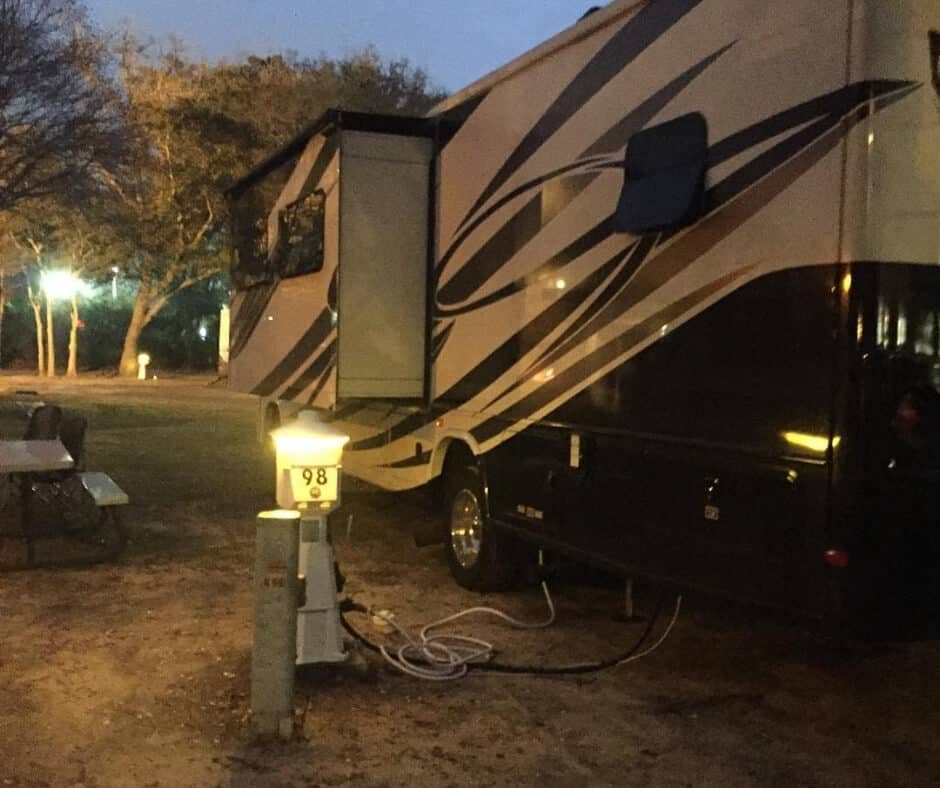
Can I Plug A 30 Amp RV Into A 50-Amp Power Pedestal?
You can plug a 30 Amp RV into a 50 Amp power pedestal, but only if you have the correct adapter, and the RV park in question allows it.
You can usually find the correct 30 to 50 Amp adapter at a hardware store with a large automotive section or an auto parts store that carries RV parts.
Some of the best RV parks even have a commissary that will have a few adapters on hand just to accommodate a situation like this.
Though you can bet that they will charge a pretty penny more for it than the box hardware store around the corner.
The adapter is set up to only allow 30 Amps of current to go through. So, you won’t have to worry about overloading your RV’s electrical system.
Can I Plug A 50 Amp RV Into A 30 Amp Shore Power Pedestal?
Let’s say you are driving down the road, your eyes are weary and you simply need to pull in to a campground or RV park to catch some much-needed shut-eye.
A quick internet search shows there’s one nearby, but the only sites they have available have 30 Amp power pedestals and your RV has a 50 Amp electrical system.
In a moment like this, you might be wondering if there is an adapter that will let you plug a 50 Amp RV into a 30 Amp shore power pedestal?
Here again, the answer is yes, there is a special adapter that will let you plug a 50 Amp RV electrical system into an RV park’s 30 Amp shore power pedestal.
The catch is that you will only be able to use a maximum of 30 Amps at any one time.
When you consider that a 30 Amp power pedestal is only capable of delivering up to 3,600 Watts at any one time, this can severely limit what you can run in your RV.
For example, let’s say that you have a 27,000 BTU Dual Air Conditioner system, that consumes 2,000 Watts.
This leaves you only a measly 1,600 Watts to run things like your 1,200 Watt electric residential-style refrigerator, 300 Watt TV, and a few LED lights.
Can I Plug My RV into a 15-Amp Home Electric Outlet?
Yes, you can indeed plug your RV into a 15 or 20 Amp residential socket with the correct adapter. Though you will still have limited wattage.
A 15 Amp circuit breaker can only deliver up to 1,800 Watts at any one time. A 20 Amp residential outlet will provide 2,400 Watts of power at any one time.
This is a great way to still use your RV at home for things like giving overnight guests a place to sleep, or hosting your kids next slumber party.
It can even be a convenient way to keep your RV’s house battery charge topped up.
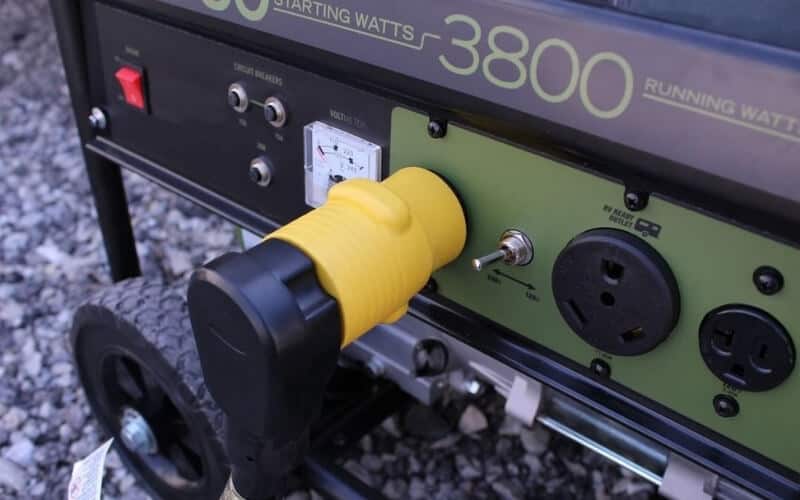
Will I Need An Adapter To Plug My RV Into A Generator?
Most RV’s that need to be charged by an aftermarket generator will require an adapter. To plug a 30-amp or 50-amp RV cord into a generator, you need to have a specific adapter.
Thankfully generators come with 3 and 4 prong styles, and the adapter to do this is relatively inexpensive.
It’s exactly the sort of thing you want to stash in your RV’s glove box. Ultimately, it’s better to have it and not need it than need it and not have it, should your own generator break down and you need to borrow someone else’s.
What Gauge Extension Cord Do I Need To Plug My RV In?
The amount of current an extension cord delivers can be limited by both the gauge as well as the distance the power has to travel from the outlet source to the RV.
While you can use a household extension cord for plugging your RV into a residential 15 or 20 Amp outlet, you will need something more robust for plugging your RV into a 30 Amp or 50 Amp shore power pedestal.
A 30-Amp RV extension cord usually uses a 10-gauge wire. Whereas a 50-Amp RV extension cord typically has a thick 6-gauge hot and neutral wire paired with an 8-gauge ground wire.
These cords are available in lengths that vary between 10 to 50 feet. The longer the cord the less effective current it can deliver at any one time.
So, ideally, you want to go as short as possible, and never go beyond 50 feet from the shore power pedestal, as the drop off of current that can be delivered is precipitous.
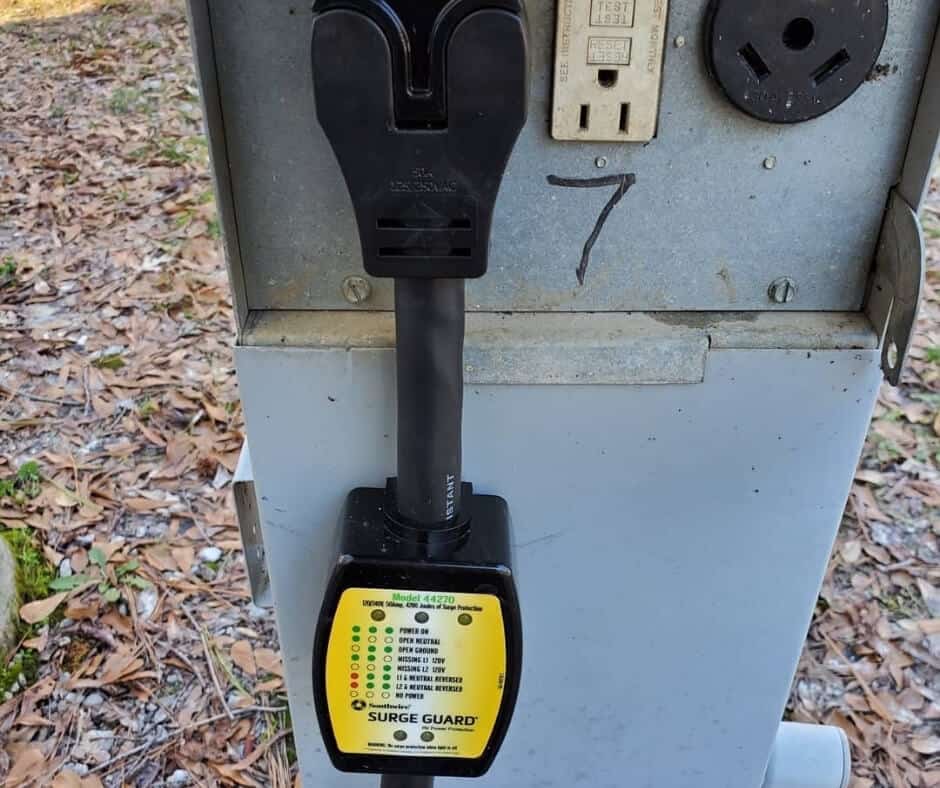
30-Amp vs. 50-Amp RV Surge Protectors: Which Do You Need?
Just like home appliances that draw a lot of power at any one time, RV surge protectors play a critical role.
More so even than residential surge protectors, as you are potentially dealing with a lot more wattage at any one given time.
Can A 50-Amp Surge Protector Plug Into A 30-amp RV Outlet?
While you might be able to physically plug it in, there won’t be any net benefit. A 50 Amp surge protector will trip at 50 Amps, which is way more than a 30 Amp RV electrical system is designed to handle.
Can I Plug A 30 Amp Surge Protector Into A 50 Amp RV Outlet?
This is the reverse problem. A 30 Amp surge protector will trip any time you go over 30-Amps, which would basically prevent you from being able to make the most out of your RV’s robust 50 Amp electrical system.
Conclusion
If you are currently shopping for a new or pre-owned RV, you are likely feeling spoiled for choice.
While things like sleeping capacity, water tank capacity, and gross vehicle weight rating tend to garner the most attention, you want to also think about the amount of electricity you are likely to use at any one time in your RV adventure.
If you are the type of person who loves to keep the RV air conditioning set to arctic cold levels while running the refrigerator on electricity, and frying breakfast over a 1,400 Watt electric frying pan, then a 50 Amp RV electrical system is probably best for you.
If you are fine with a little roughing it, you plan to cook your meals over a camp stove, and you only need a fan, TV, and some reading lights in the evening, then an RV with a 30-Amp electrical system might be best for you.
It certainly will cost less in the initial purchase price compared to a 50-Amp system, and you will also pay less for the electricity used if you plan to park up at a long-term stay RV park.

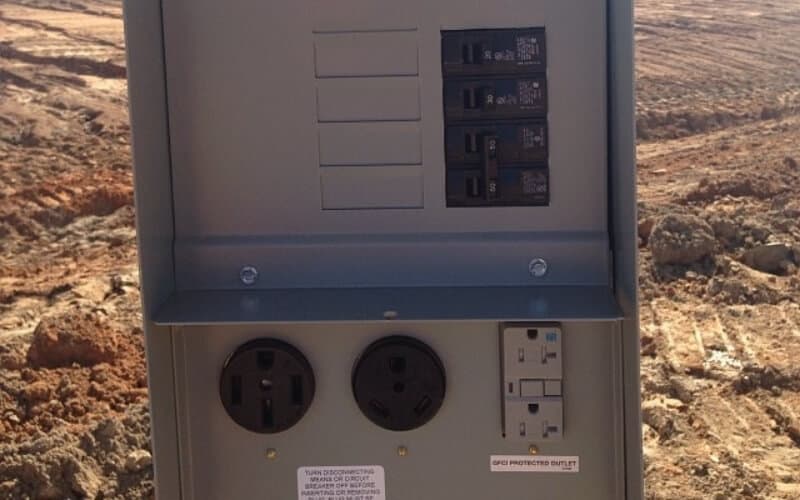

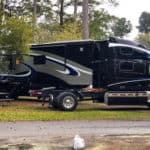
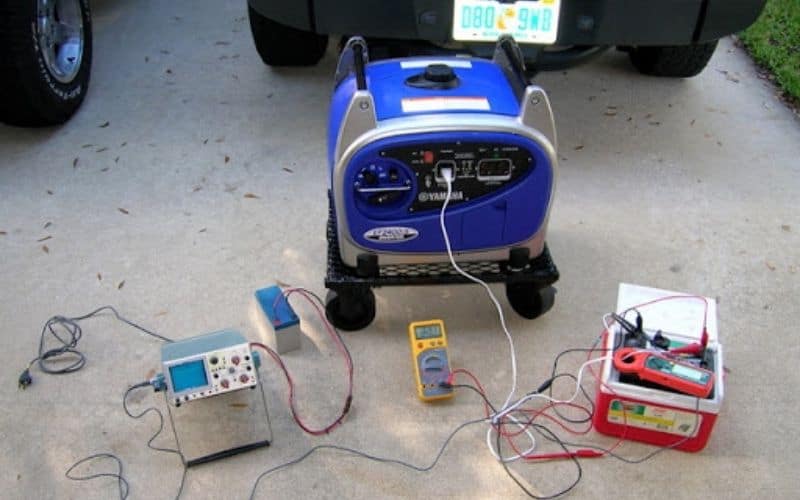
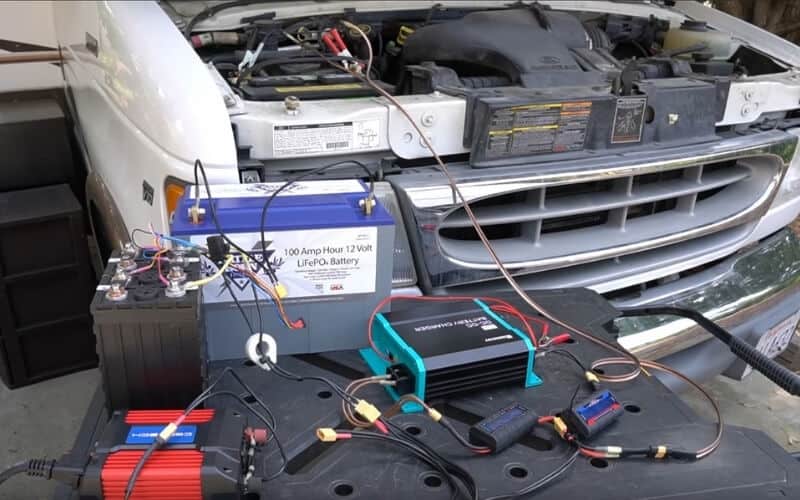
![4 Best Solar Generator For RV: Reviews in [currentyear] 6 6 Best Portable Solar Generator For Rv_ Reviews 2020](https://www.rvingknowhow.com/wp-content/uploads/2019/11/6-Best-Portable-Solar-Generator-For-Rv_-Reviews-2020.jpg)